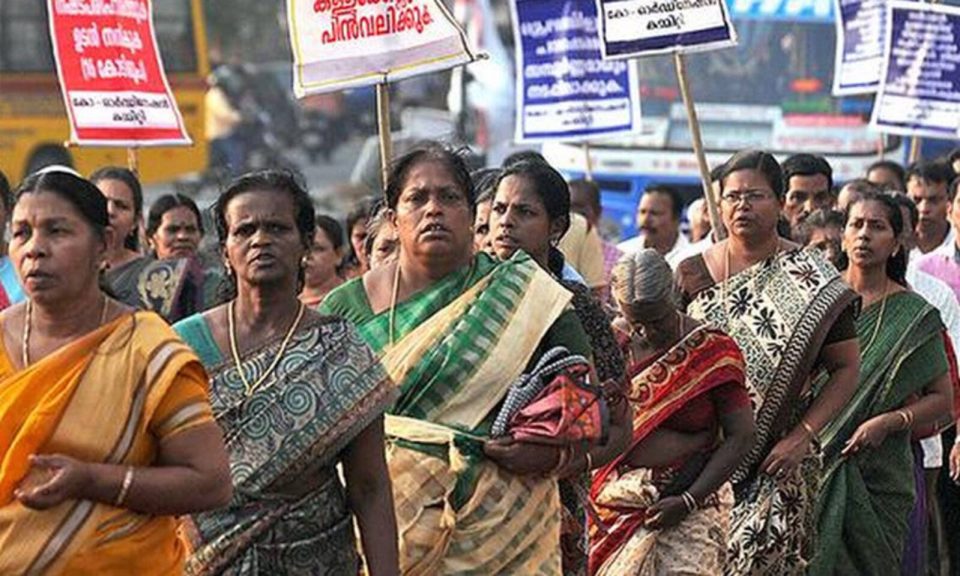
K-Rail protests rage on; Vallarpadom evictees still cry for relief 14 years later
Fourteen years after they were forcibly evicted from their houses and lands for the Vallarpadam container terminal in Kochi, 316 families of seven villages in Ernakulam’s Moolampally are waiting for the rehabilitation promised by the government.

Fourteen years after they were forcibly evicted from their houses and lands for the Vallarpadam container terminal in Kerala’s Kochi, 316 families of seven villages in Ernakulam’s Moolampally are waiting for the rehabilitation promised by the government. This assumes significance in the wake of intensified protests, mostly in fear of displacement, against the CPI(M)-led government’s flagship Silverline project in various parts of Kerala.
On February 7, 2008, 316 families belonging to Kadamakudy, Cheranaloor, Eloor, Kadungaloor, Edapally north, Edapally south and Mulavukad villages were evicted by the government for ensuring road-rail connectivity to the container terminal project.
They were promised alternative land of 4-6 cents size for housing, which would include water and electricity supply, roads and drainage. Besides this, they were also promised Rs 10,000 as one-time payment for shifting expenses and Rs 5,000 per month for rental expenses for 10 months. One person from each family was also promised a job in the terminal project.
All this came after the residents refused to let go of their lands and staged protests against the Centre, which was acquiring the land based on the British-era Land Acquisition Act 1894, which provided meagre compensation and has no mention of rehabilitation measures.
After being moved out, only 52 of the 316 families built houses in the land allotted to them, but they soon suffered damages as the land was mostly barren or marshy.
Also read: Why Pinarayi govt’s ambitious SilverLine project is facing hurdles
Wilson VP, convener of the Moolapally struggle coordination committee, told The Federal that many of the lands allotted to the families were not suitable for constructing houses.
Seetha, who was a native of Elamakkara and was allotted land at Thuthiyoor, says: “We were allotted four cents of land, of which one-fourth of a cent was given for road development. The house was constructed on the land eight years ago. The land is in a low lying region. When it rains, the place is submerged in water. Moreover, there were fissures inside the house. The house is also tilted to a side. Since our house and another house sustained these damages none of the other 54 families constructed houses in the plots allotted.”
Suresh PS, one of those who was evicted from Ponnaryamangalam, said that though the government had allotted five cents of land near Mulavukadu police station, but a house cannot be built there.
“The land allotted is attached to the river and not suitable for house construction. The family is currently living in Pachalam in rented accommodation,” he said.
A government committee entrusted to study the conditions of the lands allotted reported that the lands were not suitable for constructing houses.
Also read: Protesters in Kerala remove SilverLine project survey stones
A few families say they have not been allotted land yet.
“Mr Wilson said that though the land for many people was approved many are not constructed due to the unavailability of the funds, or the land is not suitable for construction. In certain cases though the title deeds were issued, the land was not allotted,” he added.
Diana, who was evicted from Kothad, said that though they were promised land at Thuthiyoor, it has not been allotted yet. Currently, they are residing at her husband’s sister’s house.
Seetha, Diana and other families say they did not get any of the other promises made by the government, especially jobs in the Vallarpadom terminal.
Moreover, several people who owned shops and small scale industrial establishments had to shut their businesses.
A large number of people who depended on fishing and farming in the once-sylvan region, have lost out on livelihood too.
Perhaps, the treatment of original residents of Moolampally serves as an example of how governments seldom remember their responsibility towards displaced people as a result of development work. This would be especially pertinent to the people who are likely to lose their lands and homes to the upcoming K-Rail project.

